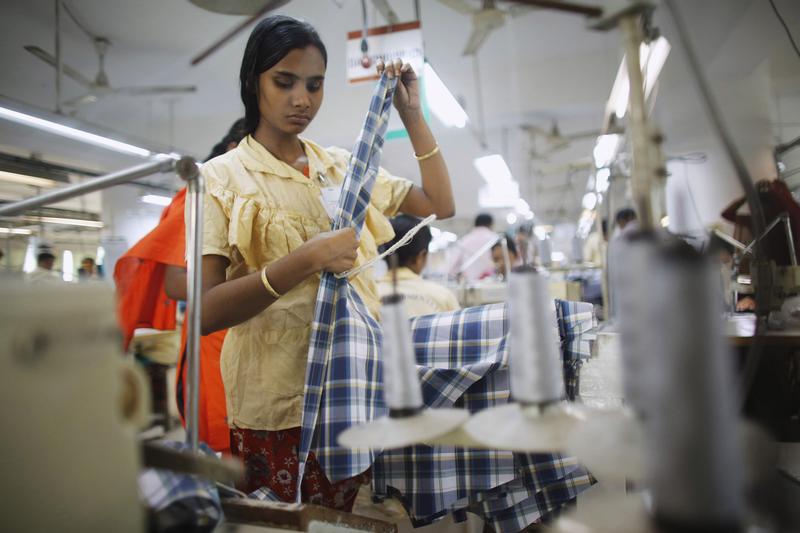Secrecy is never in fashion
| Publisher | Human Rights Watch |
| Publication Date | 15 May 2018 |
| Cite as | Human Rights Watch, Secrecy is never in fashion, 15 May 2018, available at: https://www.refworld.org/docid/5b87dda6a.html [accessed 19 May 2023] |
| Disclaimer | This is not a UNHCR publication. UNHCR is not responsible for, nor does it necessarily endorse, its content. Any views expressed are solely those of the author or publisher and do not necessarily reflect those of UNHCR, the United Nations or its Member States. |
May 15, 2018 1:03PM EDT
Published in Politiken
By Agnieszka Bielecka, Associate, Women's Rights Division
Denmark will have a new kind of "speed dating" beginning on May 15. Top fashion brands will be meeting with experts in sustainable business from across the world to exchange innovative ideas at the Copenhagen Fashion Summit. The summit's program is packed with different topics, but among them is one close to my heart – transparency in the garment industry.
Transparency in supply chains – that is, revealing exactly where a company's products are made and by whom – is really important. It allows worker representatives to better protect factory workers from abuse that can endanger their jobs, health, and even their lives. And it assures the people who buy the products, like me, that the people who made the products can easily find out which brands they produce for – a critical piece of information needed to escalate complaints about labor abuses.
 An employee works in a factory of Babylon Garments in Dhaka January 3, 2014. © 2014 Reuters
An employee works in a factory of Babylon Garments in Dhaka January 3, 2014. © 2014 Reuters
Garment workers – mostly women across the world – work in factories producing clothing for big-name brands. One of the brands whose jeans I wear every other day, Levi Strauss, is among those that produces a list of names of factories and their precise locations. It sounds like an obvious thing to do, but apparently not in the world of fashion. Multiple brands, including Mango and Urban Outfitters, whose dresses hang in my wardrobe, don't disclose key information about their supply chains.
A growing number of conscious consumers like me are keen to know where precisely--and under what conditions – our clothes were made. At the very least, publishing the names and locations of factories builds more faith in the brands we like. It demonstrates a brand's willingness to share key information with workers and advocates about their manufacturing sites, making it easier for workers to get in touch with relevant brands when they experience labor abuses. Hiding this information makes it harder for workers to reach out to brands when needed.
Three weeks ago Bangladesh marked the fifth anniversary of the Rana Plaza collapse, which killed more than 1,000 workers and injured many others. Soon after the disaster, labor advocates had to scramble to figure out which brands the workers were producing in the five garment factories in the building.
Top brands that have shown their commitment to supply chain transparency will be at the Copenhagen summit. These include Nike, H&M, C&A, G-Star Raw, and Levi Strauss, which have fully aligned with the Transparency Pledge, a threshold minimum standard of supply chain transparency in the apparel sector developed by nine non-governmental organizations and global unions.
But many other companies have declined to follow this example. Voluntarism has its limits. The EU Parliament recognized this in 2017 and called for binding due diligence obligations, but to date, no such proposal from the European Commission has followed.
Individual countries should take the initiative, and this is where Denmark should step in. Members of parliament should introduce legislation to ensure that apparel companies doing business there follow some basic degree of transparency and also conduct rigorous human rights checks.
Such legislation should draw on good features from various countries' laws --for instance, the UK's Modern Slavery Act and France's "duty of vigilance" law. Countries like the Netherlands, Australia, and Canada are also considering legislation to govern corporations' human rights responsibilities for their global supply chains.
Until Denmark develops legislation to help level the playing field for businesses, the Danish partnership for sustainable and responsible fashion and textile sector, led by apparel associations, should take a strong stand on the side of industry good practices. The partnership should make supply chain transparency a key goal that its member-companies should achieve before 2020.
Consumers want strong action, and they are watching.
Link to original story on HRW website

